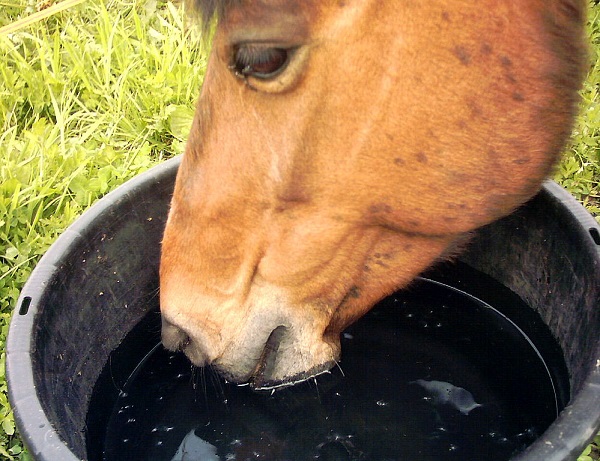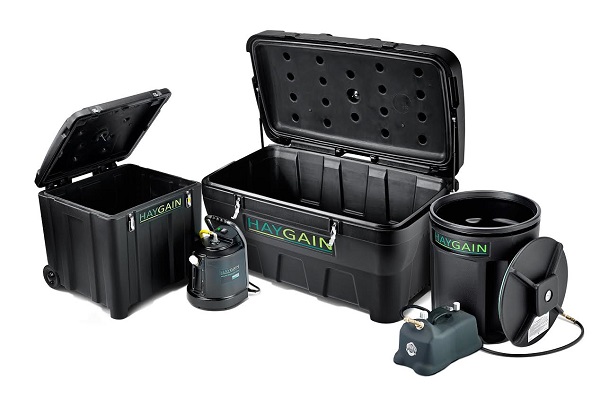Posted: 14th November 2018 | Back to news feed

There is a misconception among some horse owners that they only need to worry about keeping their horse hydrated in the summer, when exercise in the sun and heat throughout the day can cause sweating and dehydration. Paying attention to how much water your horse consumes in the warmer months, and providing electrolytes where necessary is crucial, but ensuring they are well hydrated is equally important in the winter too. Haygain examine how and why horses can become dehydrated during winter time and the steps owners can take to make sure their horses drink enough to stay healthy and avoid complications.

Why do horses become dehydrated during the colder months?
During the winter, a horse’s access to grass will be limited as grass growth slows and they are highly likely to spend more time stabled and being fed dried, stored forage. Dried forage, as the name suggests, contains less moisture than grass, so the animal is immediately losing some of the water from its diet. In addition to this, horses find drinking extremely cold water, sometimes partially frozen, far less inviting than they do the rest of the year and so they avoid drinking as much water as they actually need to.
Horses who are badly dehydrated can suffer from fatigue, kidney failure and a host of other serious complications, but even mild dehydration can lead to more serious issues. Impaction colic, where food clumps together and blocks part of the horse’s intestines, can be triggered by the animal being dehydrated.
How do I know if my horse isn’t getting enough water?
It is important to note that prevention is far better than a cure – a horse has to have lost 5% of their body weight before any visible outward signs occur (these could be sunken eyes, skin tenting or fatigue), so don’t wait to see signs that there is a problem before making stable management changes. A healthy horse should drink between 6.5 and 9 gallons of water every day, so a good place to start is to monitor how much your horse is drinking each day. The fact that horses are often stabled more in winter makes it easier to monitor how much water they are drinking, unless you have automatic drinkers of course.
How can you ensure your horse stays hydrated in winter?
If your horse undertakes strenuous exercise during the winter, feeding electrolytes in the same way as you would in summer will be necessary to ensure you are replacing essential blood salts lost in sweat. Equines sweat slightly differently to humans, and as a result they don’t get such an immediate ‘thirst trigger’ during or after exercise in the same way we do. Perhaps that’s where the old saying ‘you can lead a horse to water, but you can’t make it drink’ comes from, but it does add another important reason to the list of why owners need to ensure horses have every opportunity to stay hydrated.
Ensure there is always a plentiful supply of clean water, and make sure drinkers, troughs and buckets are kept clean. The same chores that we carry out in the summer are considerably less attractive in the winter, leading to dedicated horse owners having frozen hands, but they do still need to be addressed! Some owners have found that adding apple juice or some mint leaves to the water can aid its palatability but make sure you always offer ‘plain’ fresh water alongside this, in case your equine objects to fruity flavours in their water.
Research has shown that horses are less inclined to drink cold water, so in the winter ensuring you have access to water heaters may be a good investment to help keep your charges drinking as much as possible. Owners of geriatric horses who could be suffering from sore or broken teeth should be aware that their horse will find drinking very cold water uncomfortable and could consider providing a bucket of slightly warmer water for them to drink from.
As we mentioned a little earlier in this piece, what you feed your horse in winter will also impact their levels of hydration. If you provide hard feeds then add some water to each bucket – it may not be much, but every little will help. Steaming hay not only removes respirable dust and kills mould, fungal spores and bacteria to ensure a healthy respiratory system, it also adds moisture into the forage. Studies have found that steaming increases the water content of hay by 3x from 8% to 23%, demonstrating just how much moisture is added to the forage which will then be fed to the horse.

The Haygain Steamer range is extremely easy to use and will ensure that every mouthful of forage your horse eats this winter is adding a little more moisture to their diet. Browse the range here: https://haygain.co.uk/collections/equine-hay-steamers/products/haygain-hg-one-plus
The Equestrian Index newsfeed is compiled from articles submitted by advertising members and expresses the opinions of those members. Watsons Directories Ltd shall not be held liable for any inaccuracies or mis-statements therein.